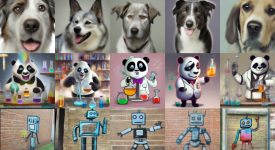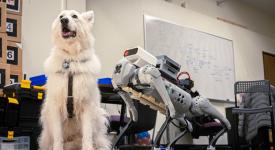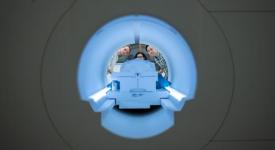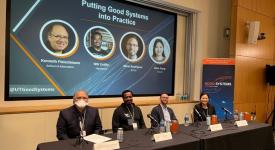NSF Funded Expedition Project Uses AI to Rethink Computer Operating Systems

05/23/2024 - Aditya Akella leads the project that aims to boost performance of OSes and help enable assistant robots, autonomous vehicles and smart cities.

05/23/2024 - Aditya Akella leads the project that aims to boost performance of OSes and help enable assistant robots, autonomous vehicles and smart cities.

05/17/2024 - Researchers are using corrupted data to help generative AI models avoid the misuse of images under copyright. Powerful new artificial intelligence models sometimes, quite famously, get things wrong — whether hallucinating false information or memorizing others’ work and offering it up as their own. To address the latter, researchers led by a team at The University of Texas at Austin have developed a framework to train AI models on images corrupted beyond recognition.

05/16/2024 - Guide-dog users and trainers can provide insight into features that make robotic helpers useful in the real world.

05/06/2024 - Music has always had the power to stir our emotions, from the exhilaration of a fast-paced rock anthem to the melancholy of a soulful ballad. But, could the music we listen to also affect how we make decisions, especially in our interactions with robots? This intriguing question lies at the heart of a study conducted by UT Austin Assistant Professor Elad Liebman and Professor Peter Stone.

03/20/2024 - From large language models to brain-machine interfaces, students work with faculty on cutting-edge research.

01/25/2024 - The University of Texas at Austin is creating one of the most powerful artificial intelligence hubs in the academic world to lead in research and offer world-class AI infrastructure to a wide range of partners.

08/11/2023 - The Department of Computer Science and the Good Systems program present a one semester-credit-hour course titled “Essentials of AI for Life and Society.” Experts in artificial intelligence predict that AI-powered technologies will continue to become more and more a part of our everyday lives. It will affect how we work, spend our leisure time, make policy decisions and make sense of the world around us. And yet, most of us don’t really understand how the technologies work or what their potential risks and benefits are.

05/01/2023 - The work relies in part on a transformer model, similar to the ones that power ChatGPTA new artificial intelligence system called a semantic decoder can translate a person’s brain activity — while listening to a story or silently imagining telling a story — into a continuous stream of text. The system developed by researchers at The University of Texas at Austin might help people who are mentally conscious yet unable to physically speak, such as those debilitated by strokes, to communicate intelligibly again.

08/05/2022 - The University of Texas at Austin and the MITRE Corporation, a nonprofit dedicated to solving problems for a safer world, have formed a partnership that includes accelerating innovative ethical artificial intelligence (AI) research currently underway by interdisciplinary teams of researchers who are part of UT Austin's Good Systems research grand challenge.

03/23/2022 - Isil Dillig is an associate professor of computer science who works to improve the security and reliability of software systems and automatically generate programs from high-level specifications. She received a Sloan Research Fellowship and an NSF CAREER award. Could you describe your main research interests?